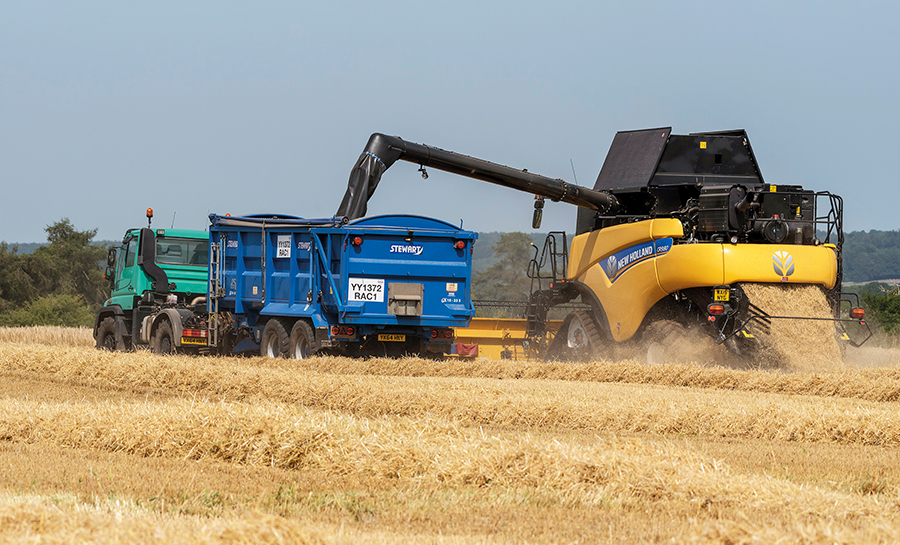Top tips to stay safe this harvest
30th July 2024
With harvest time bringing a range of safety risks, Farmers Guide offers some advice on keeping yourself safe.

Farmers are expected to be under more pressure than ever this year, after record levels of rain delayed farm operations. However, it’s essential that farmers and contractors do not cut corners and compromise safety.
Vehicles
Moving vehicles were the leading cause of farm deaths over the past five years, according to the Health & Safety Executive. All staff should wear hi-vis clothing, and traffic management such as one-way systems and speed limits can help to reduce the risk of collisions.
When parking a vehicle, apply the handbrake, engage the gear system in neutral, turn off the engine and remove the key. If there is a loader or other implement on the front, lower it before turning the engine off.
As machinery will often not have been used in many months, it’s important to check brakes and tyre pressures, and grease moving parts. Ensure oil levels are high, to avoid losing oil pressure when the machine is operating. Always switch off engines and ensure moving parts have stopped before clearing blockages or carrying out maintenance.
Additionally, claims data from NFU Mutual shows that collisions between agricultural vehicles and third parties were 61% more likely to occur during harvest months.
The rural insurer advises farmers to ensure all equipment is roadworthy – check brakes and indicators and make sure you have reflectors and a beacon for your vehicle. Use the Tilly Checklist to inspect your trailer.
Also, be aware of vulnerable road users or hidden junctions, and make contractors aware of these junctions and commonly-used walking, cycling and riding routes.
Familiarise yourself and your contractors with the speed limits for your vehicles, and if your vehicles leave mud in the road, remember to clean it up.
When turning, indicate in plenty of time and check more than once for road users on your inside. Finally, be respectful to fellow road users, but only allow them to pass when it is safe to pull over.
Fires
To reduce the risk of a combine fire, NFU Mutual advises carrying out regular maintenance and cleaning chaff and dust from hot spots in machines. Fire suppressant systems are also recommended – ensure it meets P-mark status. Additionally, ensure all fire extinguishers on combines are inspected, serviced and maintained according to the manufacturer’s manual.
Make sure harvest teams know what to do if a fire breaks out – including where the nearest water source is. Keep bowsers filled to tackle spot fires, and keep cultivators on hand to put in fire breaks in the event of a crop fire. The what3words app can help direct emergency services to fires.
Overhead power lines
Northern Powerlines, as part of its ‘Look Up, It’s Live’ campaign, urges farmers to ensure anyone working near power lines knows what to do in an emergency:
- If it’s safe to do so, drive well clear, and if not, stay in the cab and call 105
- If it’s unsafe to stay in the cab, jump well clear. Do not step down or make contact with the vehicle and the ground at the same time. Land with both feet together and make leaping strides away, so that one foot is always off the ground
- Warn others to stay clear. Damaged power lines can stay live or become live at any time without warning.
- Electricity can jump to an object or person so stay well clear – it’s not necessary to make contact with a power line to be in danger. Additionally, ground levels may have changed since your last visit to a field, so risk assess every situation, on every occasion.
Worker safety
Make sure all workers know what to do in an emergency, where potential hazards are, safe working speeds and weights for trailers, locations of first aid kits etc, and have all the emergency contact details they need. Workers must be properly trained in how to use machinery safely and have any PPE required.
Lone workers should also let someone know where they are going, approximately when they will return, and check in regularly by text or phone. A number of apps are available that can track lone workers’ locations and send alerts if they are stationary for too long.
Child safety
Yellow Wellies advises that children should not be allowed in the farm work place (young children should enjoy outdoor spaces in a secure fenced area). Any access to the work area by children under 16, e.g. for education or experience, should be planned and fully supervised by an adult not engaged in any work activity.
Children under the age of 13 years are specifically prohibited from driving or riding on any agricultural machine, and children under 16 must not drive, operate, or help to operate ATVs.
Look after yourself
And finally, in busy times it’s easy to forget to take care of yourself – but it’s essential to use sun protection, stay hydrated, eat regularly and take a break when you feel fatigued. Running on empty will impact your decision making and reaction times, increasing the risk of accidents.
Additionally, keep your mobile phone on you and charged at all times – it’s no good left in a tractor or truck – and keep a first aid kit in the cab.



